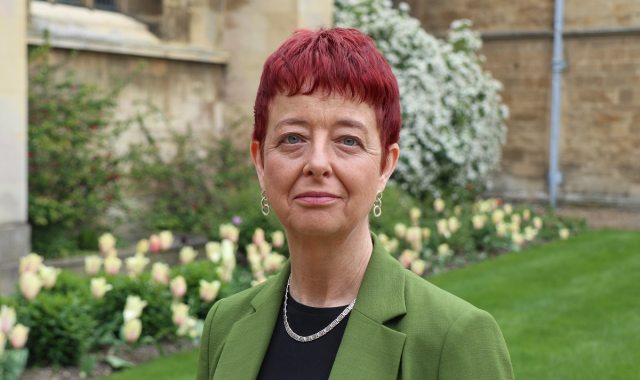Longer-term ambitions for ventilation project
- 18 June 2021
- 4 minutes
A team of Caians are looking at supporting sustainable provision of ventilators and oxygen globally – and not just during the Covid-19 pandemic
The effect of Covid-19 restrictions and the vaccination programmes has led to a sense of optimism in the United Kingdom – tempered, for now, by restrictions remaining in place until at least 19 July. Globally, the pace of the pandemic has barely receded, and the need for ventilators and oxygen has been evident in low- and middle-income countries.
The Oxygen and Ventilator System Initiative, or OVSI for short, was designed amidst the Covid-19 pandemic in a project sparked by Caians’ desire to support the response to the pandemic in spring 2020. Its affordable and easy to manufacture design means it is a sustainable solution for the longer term.
An international team led by Gonville & Caius Fellow Professor Axel Zeitler and also featuring Fellow Professor Rob Miller, Bye-Fellow Dr Zoë Fritz, and many other Caius Fellows and students, have been working on the low-cost ventilators, and exploring other solutions to the supply of oxygen to patients in respiratory need.
It became apparent that the ventilators are not just required to combat the pandemic. But the need for regulatory approval, which would have granted an emergency licence for use only during the pandemic, not longer-term, saw the group change focus to develop an Oxygen Concentrator.
“We realised early last summer that maybe ventilators are not the capacity limiting piece of equipment, but oxygen will be,” says Prof Zeitler, pointing to the recent Covid-19 surge in India, and the desperate search for oxygen.
“I think India’s not the last place we’ll see this. In the West we have liquified oxygen, which requires expensive infrastructure, but when you’ve got it, a high volume of gas fits in a smaller place and you can store it and transport it.
“Low- and middle-income countries rely on bottled oxygen. There’s far less in the bottle and it’s quite dangerous for patients to handle directly.
“From a technical point of view there’s a relatively simple solution, and that’s to extract the oxygen from the air around us; we’ve got 20 per cent oxygen in the air, and once you strip off all the nitrogen you’re pretty much left with pure oxygen.
“Pressure swing absorption – a technique which has been around for over 50 years commercially – is the answer. But the efficiency of the delivery is important with Covid: we need to deliver up to five times the rate of oxygen flow which widely available commercial devices currently are capable of.
“The stress on the system from high temperatures and humidity, and high air pollution, need to be tackled – and OVSI under the leadership of Dr Fairen-Jimenez from my department has developed an early prototype together with partners in Ethiopia and Kenya, and manufacturing options are now being explored.”
We’re still hoping to make a difference in the pandemic, because we think India is only going to be the first country where problems will arise
Prof Zeitler adds: “With the situation in India worsening there was a huge spike in attention in this technology and it’s very much in focus at the moment. We’re still hoping to make a difference in the pandemic, because we think India is only going to be the first country where problems will arise.”
He adds: “With the ventilator we’re on a trajectory to build something more sustainable. These devices aren’t just important for the pandemic – there is a shocking lack of ventilation equipment across low- and middle-income countries at the best of times. Of course, childhood pneumonia, tuberculosis, other respiratory diseases are huge killers for populations in those regions.
“Affordable high-quality ventilation is extremely important going forwards, outside the pandemic. We’re passionate to push this forward and we think the technical solution which exists can fulfil a great need going forwards.”
Ten students at the Engineering and Physical Sciences Research Council (EPSRC) Centre for Doctoral Training, which Prof Zeitler is co-director of, have begun a summer research project to optimise the existing ventilator design in order to meet the regulatory requirements, whilst remaining affordable and high quality.
Funding is being sought to allow OVSI to fulfil its aims – the comparatively small sum of a few hundred thousand pounds is needed.
For Prof Zeitler, it has been a bit of a departure from his ‘day job’, which focuses on terahertz spectroscopy and imaging in the Department of Chemical Engineering and Biotechnology. But he is accomplished at interdisciplinary work, and managing people and projects.
“There’s so much expertise, goodwill and enthusiasm around Cambridge, it’s also quite exciting to be able to do something potentially positive,” he adds.
“Where there’s a necessity there’s always a pressure to find a good solution, and maybe that’s what’s happening – a sustainable solution which benefits everybody.”
:: Pictured: the Oxygen Concentrator (credit: OVSI)


